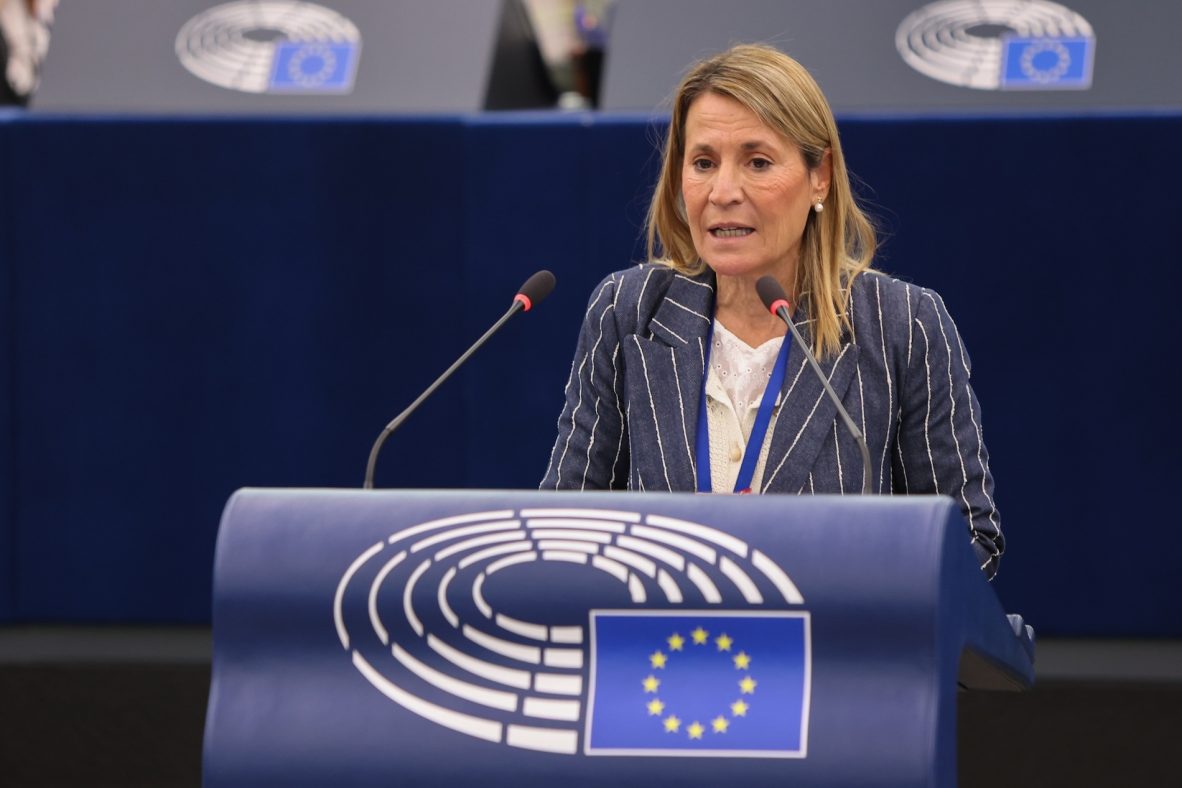Organ donation needs a new roadmap, says MEP Nevado del Campo
MEP Elena Nevado del Campo calls for a renewed EU action plan on organ donation and transplantation to tackle growing inequalities across Europe

The European Union’s last Action Plan on Organ Donation and Transplantation ended in 2015, leaving a gap in the policy framework at a time when transplant needs are growing. As member states face increasing demand, persistent inequalities in access, and limited focus on long-term patient care, a renewed EU strategy is gaining urgency.
In this interview with Euractiv, MEP Elena Nevado del Campo (Spain, EPP) discusses the priorities for a new Action Plan, from improving organ availability and data collection to strengthening psychological support, paediatric transplantation, and patient-reported outcome measures across Europe.
EV: In May 2025, you called for an update of the EU Action Plan on Organ Donation and Transplantation. What are the key areas where you believe the current EU approach is falling short?
NDC: The last Action Plan ended in 2015. Since then, the context has changed significantly. The demand for transplants has continued to grow, driven by an ageing population and the higher prevalence of chronic diseases. We also saw how the COVID-19 pandemic caused major disruption to donation and transplant programmes, with a significant reduction in activity in many Member States.
To this day, we lack an updated European framework to strengthen both organ availability and long-term care for transplant patients. We also face major inequalities between countries in terms of access, clinical follow-up and the inclusion of elements such as mental health and quality of life.
These limitations have also been highlighted by the Council of the European Union in its Conclusions of December 2024. That is why it is a priority to define a new European roadmap that addresses today’s main challenges.
EV: What priorities should be central in a renewed Action Plan, and how can it go beyond organ procurement to address long-term care and quality of life?
NDC: The new Action Plan must take a comprehensive approach to the entire process, from donation to patient follow-up. Improving organ availability remains a priority, but today we also need to make progress in other areas such as medical coordination, postoperative care, psychological support and access to rehabilitation.
Differences between countries in the quality of post-transplant care are significant, and a joint effort is needed to reduce them. We must also invest in systems that allow for the collection and comparison of data on clinical outcomes and patient well-being across the Union in a harmonised way.
Without that information, we cannot improve. The new plan should also be supported by digital tools, specialised training and the strengthening of collaboration networks among centres and professionals.
EV: You’ve been vocal about the need for more attention to paediatric transplantation in EU policy. Why is this an area that deserves greater focus, and how could Horizon Europe or EU4Health calls better support it?
NDC: Paediatric transplants require tailored attention from a medical, psychological and social point of view. Children who receive a transplant must live with the organ for many years, and this implies specific follow-up, possible reinterventions, and support throughout the different stages of their development.
Moreover, families also need guidance and ongoing support to cope with the challenges of caring for a transplanted child. Despite these particularities, the paediatric approach is still underrepresented in European policies.
Currently, programmes such as Horizon Europe and EU4Health could address this gap by promoting specific lines of research, improving care continuity from childhood to adulthood, and supporting projects that strengthen comprehensive care in these cases.
EV: What research or support gaps do you see when it comes to children living with transplanted organs, particularly in areas like rejection management and psychological support?
NDC: There are still many unresolved issues. We need more long-term studies on the effects of transplantation in children, on adherence to immunosuppressive treatment during adolescence, and on how to adapt clinical protocols to the different stages of growth.
In many countries, there is no real integration between clinical follow-up and psychological support, although both are fundamental for the patient’s progress. Nor is there sufficient comparable data at the European level on outcomes in the paediatric population. The EU should promote specific research in this field and facilitate the development of common mechanisms to collect and compare data in a harmonised way throughout the Union, in order to support evidence-based decisions.”
EV: How can the EU better support Member States in strengthening post-transplant care, especially for chronic complications like Graft-versus-Host Disease or long-term organ rejection?
NDC: One of the key elements is strengthening cooperation among Member States. The EU can contribute by promoting the exchange of best practices, funding networks of specialised centres, and facilitating the continuous training of medical teams.
It is also important to move towards digital follow-up systems that enable more precise monitoring of long-term complications. Furthermore, we must adopt a positive vision. The new MFF, within the Competitiveness Fund, includes a specific allocation for health, biotechnology and bioeconomy amounting to 20 billion euros, effectively increasing the budget allocated to these areas compared to the previous framework. This makes it possible to finance such specialised centres in the future.
EV: Would you support EU guidelines or coordination mechanisms to ensure transplant survivors across Europe have equitable access to follow-up care, rehabilitation, and mental health services?
Considering that public health is a competence of the Member States, it is true that the EU can issue recommendations or guidelines. Current differences between countries in these types of services are significant. Some people receive comprehensive and continuous follow-up, while others barely have access to basic check-ups.
The creation of EU guidelines would help improve care quality, increase transparency and provide a shared foundation on which each Member State can build its policies. Access to rehabilitation, mental health and family support must be part of the post-transplant process, not as a complementary element, but as an essential component of clinical and personal success.
EV: There’s a growing consensus around the need for better EU-wide data collection on transplant outcomes. How can the EU facilitate this without overburdening national systems?
NDC: The key lies in offering useful, interoperable, and technically viable solutions. National systems should not face new administrative burdens but rather receive support to improve the collection and analysis of the data they already generate. The EU can facilitate this by funding innovative digital tools, providing technical training, and promoting common platforms that allow for anonymous and secure comparison of results. It is also important to integrate these systems with existing registries, always ensuring compliance with data protection legislation. Having reliable information is crucial to identifying improvements, planning resources and assessing the impact of public policies.”
EV: How important is the integration of Patient-Reported Outcome Measures (PROMs) in shaping future policy and funding decisions on transplantation and survivorship?
NDC: It is essential. The patient must be at the centre of the system. Evaluating a transplant solely in terms of survival or organ function is insufficient. We need to understand how the transplant recipient lives, their level of well-being, their ability to return to work, or their autonomy. PROMs provide this key information and should be integrated into both clinical evaluation and political decision-making.
EV: Do you believe that transplant-related R&D, particularly in areas like personalised immunosuppression or rejection prediction, receives adequate attention in current EU programmes?
NDC: Although the European Union does not have direct competencies in the organisation of healthcare systems, it can and should play a decisive role in prevention. In the field of transplantation, prevention is not limited to avoiding organ rejection; it involves ensuring the patient’s clinical stability and long-term quality of life.
This requires adequate follow-up of immunosuppressive treatments, early detection of chronic complications, and continuous psychological support. At present, these preventive dimensions are underrepresented in European programmes.
We hope the next Multiannual Financial Framework will fund projects aimed at addressing such needs. A European policy focused on prevention would help reduce inequalities, improve outcomes, and alleviate the long-term burden on national healthcare systems.
EV: What role can Parliament play in ensuring future EU budgets prioritise long-term outcomes and innovation in transplant medicine?
NDC: Parliament has the responsibility to ensure that a long-term approach is embedded in European health policies. This means ensuring that resources are directed not only at responding to emergencies, but also at consolidating sustainable, evidence-based solutions. In the area of transplantation, this means prioritising quality of life, supporting clinical and technological innovation, and reducing inequalities between countries.
As the European People’s Party, we work to ensure these priorities are reflected in the future Multiannual Financial Framework, in health and research programmes, and also in cohesion, education and digitalisation policies.
The ultimate goal is clear: to ensure that every transplant patient receives continuous and quality care, under equitable conditions, and with a patient-centred approach.
(BM)


